Plato
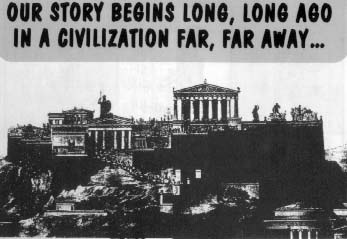 Today, we tend to think of Greek art and culture as "classical." By that
we mean cool, clean lines, white marble sculpture, tapering columns-- grace and restraint.
In reality Greek buildings and statures were painted in bright, garish colors. The paint
wore off over time, thus leaving us with the wrong impression. The Greeks, as we know from
their writing, were actually a people torn between reason and madness, freedom and slavery,
war and peace, life and death.
Today, we tend to think of Greek art and culture as "classical." By that
we mean cool, clean lines, white marble sculpture, tapering columns-- grace and restraint.
In reality Greek buildings and statures were painted in bright, garish colors. The paint
wore off over time, thus leaving us with the wrong impression. The Greeks, as we know from
their writing, were actually a people torn between reason and madness, freedom and slavery,
war and peace, life and death.
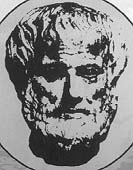 Plato was born in the year 427 B.C. in the polis of Athens, named after
the goddess Athena who embodied the ideals of strength in peace, a state which then proved very
difficult to achieve and maintain. After years of fighting with other city states as well as internal
factions, disaster struck in the form of a PLAGUE:
Plato was born in the year 427 B.C. in the polis of Athens, named after
the goddess Athena who embodied the ideals of strength in peace, a state which then proved very
difficult to achieve and maintain. After years of fighting with other city states as well as internal
factions, disaster struck in the form of a PLAGUE: 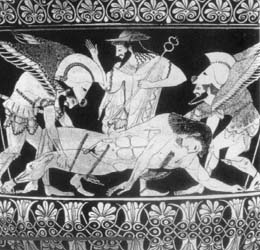 <
<
Athens is known as the birthplace of democracy; but in reality,
it was a three-tiered society. The first tierconsisted of all the male citizens, ranging from
wealthy landowners to merchants. The second tier consisted of free women and resident
foreigners. The third tier consisted of the large slave population. Only the male citizens
could vote in the Assembly and hold positions in the Council, which governed the city-state.
Plato was born into one of Athens' oldest and most aristocratic families where his studies included
reading classics, writing on tablets, playing music and working out in the gymnasium. As he grew older,
his interest in philosophy was awakened by his mentor, Socrates, born around 469 B.C. 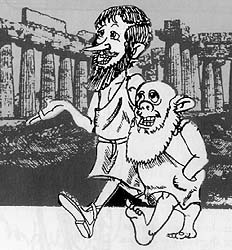
Socrates was a brilliant busybody and troublemaker who had the exciting but unpleasant task of making
everyone think. He was an expert in oral communication and never wrote a word of philosophy.
Plato recreates the Socratic dialogues in his book The Republic. as well as the character of
Socrates. Like Plato, Socrates believed in absolute justice and truth, in contrast to the sophists,
relativists and skeptics who claimed that the only important thing in life was to get what you want--
and the only way to get it was to persuade others to give to it to you through "rhetoric." Thrasymachus
is the sophist in The Republic.
In order to understand Plato, we must realize that his views are the opposite of Jean-Paul Sartre's:
Plato believes essence precedes existence; in fact, there is an invisible world where truth, beauty and
justice remain eternal and unchanging. Our sensuous human existence is analogous to the reflections
of cavemen. The true world lies outside the cave, in the eye of the mind where the REALM OF THE
FORMS exists. 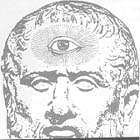 While man in his natural state is subject to imperfections,
his immortal soul, through good works and if necessary, reincarnations can attain true goodness and
perfection in the invisible world of the FORMS. Christians such as St. Augustine later manipulated
Plato's invisible world of goodness to represent God's paradise, saying Plato was Christianity for
the masses. But there is a big difference: Plato wanted man to achieve divinity through reason,
understanding and wisdom, while Christ solicits all those who are heavy laden, poor, sick, downtrodden,
even retarded, as long as they have faith. There is no intellectual striving for a higher state
of reasoning in the Bible; in fact too much reasoning and analysis and science has historically been a
threat to the church. Plato's theory of the forms has some resemblance to new physics because
it describes a world that cannot be measured by the senses. For example, Plato said that circles would still exist
even if no one ever saw them. Plato had great respect for mathematics. In 387 B.C., when he
founded his school, The Academy, he put this sign on the door:
While man in his natural state is subject to imperfections,
his immortal soul, through good works and if necessary, reincarnations can attain true goodness and
perfection in the invisible world of the FORMS. Christians such as St. Augustine later manipulated
Plato's invisible world of goodness to represent God's paradise, saying Plato was Christianity for
the masses. But there is a big difference: Plato wanted man to achieve divinity through reason,
understanding and wisdom, while Christ solicits all those who are heavy laden, poor, sick, downtrodden,
even retarded, as long as they have faith. There is no intellectual striving for a higher state
of reasoning in the Bible; in fact too much reasoning and analysis and science has historically been a
threat to the church. Plato's theory of the forms has some resemblance to new physics because
it describes a world that cannot be measured by the senses. For example, Plato said that circles would still exist
even if no one ever saw them. Plato had great respect for mathematics. In 387 B.C., when he
founded his school, The Academy, he put this sign on the door: 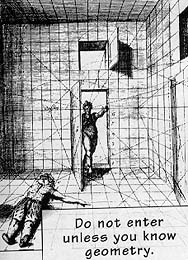 The purpose
of mathematics was to free the mind to be able to study philosophy, and the goal of philosophical
studies was the study of the FORMS. Through mathematical equations, modern physicists have
created a world that is not perceptible to our naked senses. However, unlike Plato's invisible
world, nuclear and cosmological physics is relativistic and not necessarily governed by the "good."
The purpose
of mathematics was to free the mind to be able to study philosophy, and the goal of philosophical
studies was the study of the FORMS. Through mathematical equations, modern physicists have
created a world that is not perceptible to our naked senses. However, unlike Plato's invisible
world, nuclear and cosmological physics is relativistic and not necessarily governed by the "good."
It is essential to have a background in Greek history and culture as well as Plato's life and
philosophy in order to understand his utopia, The Republic. It is different from communism
and democracy, aristocracy and tyranny as we know them. 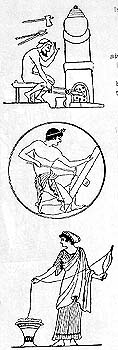 Everyone must
specialize in a job that suits him or her best, whether it be a farmer, craftsman, guardian etc. and
stick to the lifestyle conducive to that job. There are workers, warriors and guardians ruled
by a philospher/king, the only one allowed two specialties, philosophy and politics. In order to prevent the community
from turning into an oligarchy, the ruling classes cannot possess private property and must share
housing, meals, sex and children. Mating (at the marriage festivals) is a form of eugenics to breed a superior race, disposing of
inferior or unwanted offspring through infanticide or just prevention and abstinence. However,
civil rights activists will be pleased to learn that women and men would have equal opportunity
for all positions including fighting for or governing the "Republic." Plato had a holistic (right/left brain)
approach to education, including both MUSIC and GYMNASTICS to make spirit, mind and body harmonious
and strong. Music includes not only sounds and rhythms but poetry, which is carefully censored to convey
impressions of justice and good disposition. Although this community might be stultifying and
rigid for many people, it was also Plato's way of avoiding the discord, corruption and chaos of
his times. It was his heaven on earth.
Everyone must
specialize in a job that suits him or her best, whether it be a farmer, craftsman, guardian etc. and
stick to the lifestyle conducive to that job. There are workers, warriors and guardians ruled
by a philospher/king, the only one allowed two specialties, philosophy and politics. In order to prevent the community
from turning into an oligarchy, the ruling classes cannot possess private property and must share
housing, meals, sex and children. Mating (at the marriage festivals) is a form of eugenics to breed a superior race, disposing of
inferior or unwanted offspring through infanticide or just prevention and abstinence. However,
civil rights activists will be pleased to learn that women and men would have equal opportunity
for all positions including fighting for or governing the "Republic." Plato had a holistic (right/left brain)
approach to education, including both MUSIC and GYMNASTICS to make spirit, mind and body harmonious
and strong. Music includes not only sounds and rhythms but poetry, which is carefully censored to convey
impressions of justice and good disposition. Although this community might be stultifying and
rigid for many people, it was also Plato's way of avoiding the discord, corruption and chaos of
his times. It was his heaven on earth.
Read The Republic on your own and then click here to answer
questions in preparation for the midterm. Or test your knowledge of all the readings with the cybergame show,
YOU BET YOUR SOUL!
Clickhereto return to Heaven
or Hell syllabus.
 Today, we tend to think of Greek art and culture as "classical." By that
we mean cool, clean lines, white marble sculpture, tapering columns-- grace and restraint.
In reality Greek buildings and statures were painted in bright, garish colors. The paint
wore off over time, thus leaving us with the wrong impression. The Greeks, as we know from
their writing, were actually a people torn between reason and madness, freedom and slavery,
war and peace, life and death.
Today, we tend to think of Greek art and culture as "classical." By that
we mean cool, clean lines, white marble sculpture, tapering columns-- grace and restraint.
In reality Greek buildings and statures were painted in bright, garish colors. The paint
wore off over time, thus leaving us with the wrong impression. The Greeks, as we know from
their writing, were actually a people torn between reason and madness, freedom and slavery,
war and peace, life and death.
 Plato was born in the year 427 B.C. in the polis of Athens, named after
the goddess Athena who embodied the ideals of strength in peace, a state which then proved very
difficult to achieve and maintain. After years of fighting with other city states as well as internal
factions, disaster struck in the form of a PLAGUE:
Plato was born in the year 427 B.C. in the polis of Athens, named after
the goddess Athena who embodied the ideals of strength in peace, a state which then proved very
difficult to achieve and maintain. After years of fighting with other city states as well as internal
factions, disaster struck in the form of a PLAGUE:  <
<
 While man in his natural state is subject to imperfections,
his immortal soul, through good works and if necessary, reincarnations can attain true goodness and
perfection in the invisible world of the FORMS. Christians such as St. Augustine later manipulated
Plato's invisible world of goodness to represent God's paradise, saying Plato was Christianity for
the masses. But there is a big difference: Plato wanted man to achieve divinity through reason,
understanding and wisdom, while Christ solicits all those who are heavy laden, poor, sick, downtrodden,
even retarded, as long as they have faith. There is no intellectual striving for a higher state
of reasoning in the Bible; in fact too much reasoning and analysis and science has historically been a
threat to the church. Plato's theory of the forms has some resemblance to new physics because
it describes a world that cannot be measured by the senses. For example, Plato said that circles would still exist
even if no one ever saw them. Plato had great respect for mathematics. In 387 B.C., when he
founded his school, The Academy, he put this sign on the door:
While man in his natural state is subject to imperfections,
his immortal soul, through good works and if necessary, reincarnations can attain true goodness and
perfection in the invisible world of the FORMS. Christians such as St. Augustine later manipulated
Plato's invisible world of goodness to represent God's paradise, saying Plato was Christianity for
the masses. But there is a big difference: Plato wanted man to achieve divinity through reason,
understanding and wisdom, while Christ solicits all those who are heavy laden, poor, sick, downtrodden,
even retarded, as long as they have faith. There is no intellectual striving for a higher state
of reasoning in the Bible; in fact too much reasoning and analysis and science has historically been a
threat to the church. Plato's theory of the forms has some resemblance to new physics because
it describes a world that cannot be measured by the senses. For example, Plato said that circles would still exist
even if no one ever saw them. Plato had great respect for mathematics. In 387 B.C., when he
founded his school, The Academy, he put this sign on the door:  The purpose
of mathematics was to free the mind to be able to study philosophy, and the goal of philosophical
studies was the study of the FORMS. Through mathematical equations, modern physicists have
created a world that is not perceptible to our naked senses. However, unlike Plato's invisible
world, nuclear and cosmological physics is relativistic and not necessarily governed by the "good."
The purpose
of mathematics was to free the mind to be able to study philosophy, and the goal of philosophical
studies was the study of the FORMS. Through mathematical equations, modern physicists have
created a world that is not perceptible to our naked senses. However, unlike Plato's invisible
world, nuclear and cosmological physics is relativistic and not necessarily governed by the "good."
 Everyone must
specialize in a job that suits him or her best, whether it be a farmer, craftsman, guardian etc. and
stick to the lifestyle conducive to that job. There are workers, warriors and guardians ruled
by a philospher/king, the only one allowed two specialties, philosophy and politics. In order to prevent the community
from turning into an oligarchy, the ruling classes cannot possess private property and must share
housing, meals, sex and children. Mating (at the marriage festivals) is a form of eugenics to breed a superior race, disposing of
inferior or unwanted offspring through infanticide or just prevention and abstinence. However,
civil rights activists will be pleased to learn that women and men would have equal opportunity
for all positions including fighting for or governing the "Republic." Plato had a holistic (right/left brain)
approach to education, including both MUSIC and GYMNASTICS to make spirit, mind and body harmonious
and strong. Music includes not only sounds and rhythms but poetry, which is carefully censored to convey
impressions of justice and good disposition. Although this community might be stultifying and
rigid for many people, it was also Plato's way of avoiding the discord, corruption and chaos of
his times. It was his heaven on earth.
Everyone must
specialize in a job that suits him or her best, whether it be a farmer, craftsman, guardian etc. and
stick to the lifestyle conducive to that job. There are workers, warriors and guardians ruled
by a philospher/king, the only one allowed two specialties, philosophy and politics. In order to prevent the community
from turning into an oligarchy, the ruling classes cannot possess private property and must share
housing, meals, sex and children. Mating (at the marriage festivals) is a form of eugenics to breed a superior race, disposing of
inferior or unwanted offspring through infanticide or just prevention and abstinence. However,
civil rights activists will be pleased to learn that women and men would have equal opportunity
for all positions including fighting for or governing the "Republic." Plato had a holistic (right/left brain)
approach to education, including both MUSIC and GYMNASTICS to make spirit, mind and body harmonious
and strong. Music includes not only sounds and rhythms but poetry, which is carefully censored to convey
impressions of justice and good disposition. Although this community might be stultifying and
rigid for many people, it was also Plato's way of avoiding the discord, corruption and chaos of
his times. It was his heaven on earth.